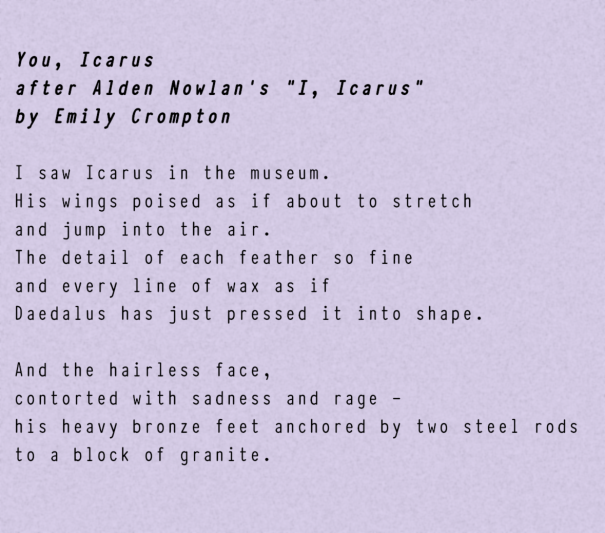A short interview with the First Prize winner of the 2018 QWF Prize for Young Writers, Emily Crompton.
To find out more about the 2019 QWF Prize for Young Writers, including how to apply, see our Submittable page. The deadline is Friday, June 14, 2019!

Emily Crompton, 25, was the winner of last year’s QWF Prize for Young Writers with her powerful poem, You, Icarus after Alden Nowlan’s “I, Icarus,” originally published in The Antigonish Review. Since entering the prize, she’s been focusing on her thesis and thinking of putting out a chapbook. We spoke with her to catch up on her latest projects and reflect upon her last year of writing.
What have you been working on since winning last year?
I completed my MA thesis in poetry soon after winning the prize, so I put writing down for a bit to focus on editing. Since about March, I’ve started to write more aggressively and revise my thesis. I’m hoping to turn it into a chapbook in the coming year.
What led you to enter You, Icarus to the QWF Prize for Young Writers?
You, Icarus was my strongest piece that was published in the time period outlined by the prize. I also felt like it was the poem that best represented my work.
Are there any writers that you consider particularly influential on your work?
I have to say Alden Nowlan, of course, since I was responding to his work. Sue Sinclair is another writer who has influenced my writing, especially the way she blends Classical mythology into her poetry. I’ve also been reading Léonard Forest’s Le Pommier d’Aout. Although I haven’t been reading him for as long, I feel like his descriptions of the ocean, landscapes, and city spaces have already altered how I write.
What did winning mean to you?
Being nominated was validating. It can be lonely to write and it’s hard to tell sometimes when a piece is effective. Being published, being nominated, and eventually winning the QWF Prize for Young Writers helped confirm that something in the poem was working and resonating with other people.
As a younger writer, your style is always developing. Do you see any differences between your previous work and anything you’ve been working on more recently?
My work has changed stylistically but I think I’ve built from my earlier work rather than reconstructed it. Since last year, I’ve started to incorporate more translations into my work. The act of reading and translating has made me more aware of how I use words in poetry.